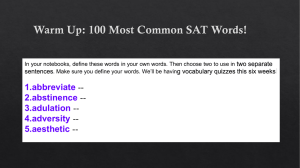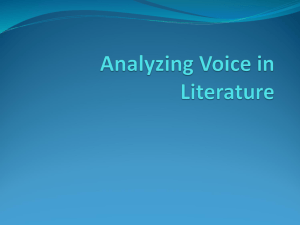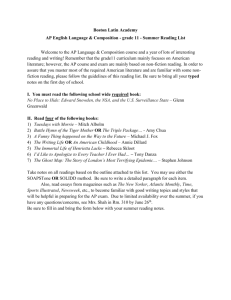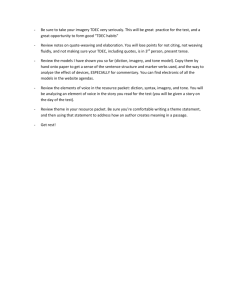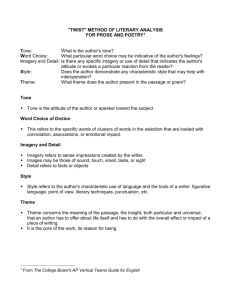Voice PowerPoint
advertisement
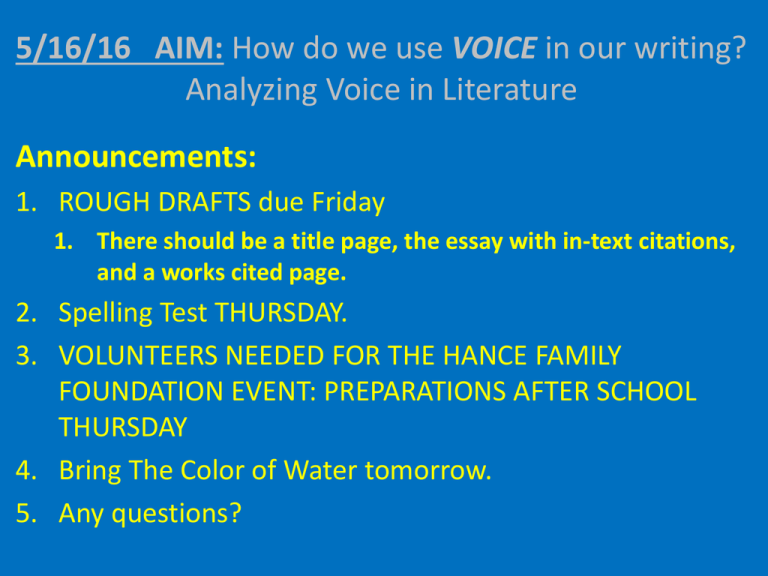
5/16/16 AIM: How do we use VOICE in our writing? Analyzing Voice in Literature Announcements: 1. ROUGH DRAFTS due Friday 1. There should be a title page, the essay with in-text citations, and a works cited page. 2. Spelling Test THURSDAY. 3. VOLUNTEERS NEEDED FOR THE HANCE FAMILY FOUNDATION EVENT: PREPARATIONS AFTER SCHOOL THURSDAY 4. Bring The Color of Water tomorrow. 5. Any questions? Voice is… An author’s distinctive use of language to express his or her persona. Another way of describing voice is that it is the narrator’s personality as established through the choices they make in his/her writing. OR Diction + Syntax + Imagery + Other Literary Devices = Voice (author’s personality) What is the author’s personality or voice? How do they establish this voice (look at diction, syntax and imagery)? How could you be so cold as the winter wind when it breeze yo Just remember that you talking to me though You need to watch the way you talking to me yo I mean after all the things that we been through I mean after all the things we got into Voice vs Tone: If voice is the personal style, the personality, than tone is how that person is feeling. • DICTION (word choice) is the foundation of voice and contributes to all of its elements • DETAIL (facts, observations, and incidents) is used to develop a topic, shaping and seasoning voice • IMAGERY (verbal representation of sense experience) brings the immediacy of sensory experience to writing and gives voice a distinctive quality • SYNTAX (grammatical sentence structure) controls verbal pacing and focus • TONE (expression of attitude) gives voice its distinctive personality SYNTAX Consider: I slowed still more, my shadow pacing me, dragging its head through the weeds that hid the fence. -William Faulkner The Sound and the Fury Discuss: 1. In this sentence, form imitates meaning. How does Faulkner slow the sentence down, reinforcing the sentence’s meaning? 2. How would the impact of the sentence change if we rewrote the sentence to read: I slowed still more. My shadow paced me and dragged its head through the weed-obscured fence. SYNTAX Consider: He slowly ventured into the pond. The bottom was deep, soft clay, he sank in, and the water clasped dead cold around his legs. -D.H. Lawrence, “The Horse-Dealer’s Daughter” Discuss: 1. What effect does sentence length have on this passage? 2. Examine the second sentence. How does the structure of the sentence reinforce meaning? SYNTAX Consider: I hear an army charging upon the land. And the thunder of horses plunging, foam about their knees: Arrogant, in black armor, behind them stand, Disdaining the reins, with fluttering whips, the charioteers. -James Joyce. “I hear an Army Charging Upon the Land” Discuss: 1. The subject of the verb stand in line 3 is charioteers at the end of line 4. How does this inversion of the normal word order (subject-verb) affect the impact of those lines? 2. Examine the adjectives and adjective phrases in lines 3 and 4: arrogant, in black armor. What words do these adjectives modify? How does this unusual word order affect the impact of the lines? DICTION Consider: As I watched, the sun broke weakly through, brightened the rich red of the fawns, and kindled their white spots. Discuss: 1. What kind of flame does kindled imply? How does this verb suit the purpose of the sentence? 2. Would the sentence be strengthened or weakened by changing the sun broke weakly through to the sun burst through? Explain the effect this change would have on the use of the verb kindled. DICTION Consider: Once I am sure there’s nothing going on I step inside, letting the door thud shut. -Philip Larkin, “Church Going” Discuss: 1. What feelings are evoked by the word thud? 2. How would the meaning change if the speaker let the door slam shut? DICTION Consider: Wind rocks the car. We sit parked by the river, Silence between our teeth. Birds scatter across islands Of broken ice… Discuss: 1. What are the feelings produced by the word rocks? Are the feelings gentle, violent, or both? 2. How would the meaning change if we changed the first line to Wind shakes the car? DETAIL Consider: About the suffering they were never wrong The Old Masters: how well they understood Its human position; how it takes place While someone else is eating or opening a window or just walking dully along; -W.H. Auden, “Musee des Beaux Arts Discuss: 1. Suffering is a general term. What is a general term that sums up the detail in line 4(-5)? 2. Compare line 4(-5) with the following: While someone else is not suffering Why is Auden’s line more effective? DETAIL Consider: The dog stood up and growled like a lion, stiff-standing hackles, teeth uncovered as he lashed up his fury for the charge. Tea Cake split the water like an otter, opening his knife as he dived. The dog raced down the back-bone of the cow to the attack and Janie screamed and slipped far back on the tail of the cow, just out of reach of the dog’s angry jaws. Discuss: 1. Which details reveal that the dog has rabies? What effect do these details have on the reader? 2. Contrast the details used to describe Tea Cake (the male protagonist) and Janie (the female protagonist). What do these details reveal about the author’s attitude toward these two characters? IMAGERY Consider: She looked into the distance, and the old terror flamed up for an instant, then sank again. Edna heard her father’s voice and her sister Margaret’s. She heard the barking of an old dog that was chained to the sycamore tree. The spurs of the cavalry officer clanged as he walked across the porch. There was a hum of bees, and the mucky odor of pinks filled the air. Kate Chopin, The Awakening Discuss: 1. Although the narrator “looks into the distance,” the images are primarily auditory. What are the auditory images in the passage? What mood do these images create? 2. The last sentence of this passage contains an olfactory image (the musky odor of pinks fill the air). What affect does the use of an olfactory image, after a series of auditory images, have on the reader? IMAGERY Consider: As for the grass, it grew as scant as hair In leprosy; thin dry blades pricked the mud Which underneath looked kneaded up with blood. One stiff blind horse, his every bone a-stare, Stood stupefied, however he came there: Thrust out past service from the devil’s stud! -Robert Browning, “Child Roland to the Dark Tower Came” Discuss: 1. What feelings are produced by the image of the grass in lines 1-3? 2. Does the imagery of the horse inspire sympathy? Explain, IMAGERY Consider: In the midst of poverty and want, Felix carried with pleasure to his sister the first little white flower that peeped out from beneath the snowy ground. -Mary Shelley, Frankenstein Discuss: 1. What do you understand about Felix from the imagery of this sentence? 2. How would the effect be different if Felix carried his sister a big bouquet of spring flowers? TONE Consider: There is no drop of water in the ocean, not even in the deepest parts of the abyss, that does not know and respond to the mysterious forces that create the tide. No other force that affects the sea is so strong. Compared with the tide the wind-created waves are surface movements felt, at most, no more than a hundred fathoms below the surface. -Rachel Carson, The Sea Around Us Discuss: 1. What is Carson’s attitude toward the tide? 2. Carson uses negative constructions several times in this paragraph (“There is no…, not even in the…, that does not know,…. No other force) which is in contrast to a positive tone. How does the use of negatives create such a positive tone? TONE Consider: In Pride, in reasoning Pride, our error lies; All quit their sphere, and rush into the skies. Pride still is aiming at the best abodes, Men would be Angels, Angels would be Gods. Aspiring to be Gods, if Angels fell, Aspiring to be Angels, Men rebel: And who but wishes to invert the laws Of Order, sins against th’ Eternal Cause. -Alexander Pope Discuss 1. What is Pope’s attitude toward pride, the subject matter? 2. What is the tone of this passage? What attitude underlies the tone? TONE Consider: And I started to play. It was so beautiful. I was so caught up in how lovely I looked that at first I didn’t worry how I would sound. So it was a surprise to me when I hit the first wrong note and I realized something didn’t sound quite right. And then I hit another and another followed that. A chill started at the top of my head and began to trickle down. Yet I couldn’t stop playing, as though my hands were bewitched. I kept thinking my fingers would adjust themselves back, like a train switching to the right track. I played this strange jumble through two repeats, the sour notes staying with me all the way to the end. Discuss: 1. How does the narrator’s attitude toward her performance change in the passage?+2. How does the author’s use of detail, diction, and imagery reveal the narrator’s changing attitude?
